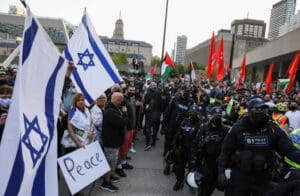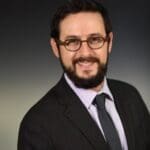Advocating for Humanity During War
Many of us have been overwhelmed by the tragic, unspeakable events that have resulted in the escalating Israel-Hamas War. We may experience a variety of emotions and hold our own narratives as we are exposed to horrific images and news stories. Undoubtedly some of Council for Relationships’ clients, along with our colleagues and family members are also in turmoil over these recent events. Their perspectives may enter our therapeutic spaces and require us to hold them. I recently saw a couple who volunteered to tell me how the war has disrupted their ability to focus on their relationship. It is a confusing, painful, and frightening time for the world.
My son, Ari Gordon, is the Director of Muslim-Jewish Relations at the American Jewish Committee. I hope what he shares below can lend some perspective and balance to the pain experienced by all participants and observers of this unfolding human tragedy. – Susan Gordon, CFR Staff Therapist
A Guest Blog by Dr. Ari M. Gordon on the Israel-Hamas War
I have been in mourning and at an absolute loss for adequate words. I am still struggling to see what can be said as over 1,400 Israelis are mourning family members slaughtered by Hamas, healing from personal injury, and with scores still held hostage and threats of attack persist—my heart breaks and worries for my people. Likewise, as millions of Gazans are at risk of displacement, injury, and death, my heart aches for our extended human family. We must pray and take action for the safety of all of those innocent lives, the millions of “whole worlds,” who are in harm’s way.
I am also hearing from bridge builders and those with friends across the identity divides tied to this conflict who feel torn apart – not by a lack of moral clarity over Hamas’ brutality against Israelis or over genuine concern for the loss of innocent Palestinian lives. But inter-communal divides: on how we got here & what should come next, or divergence over where our mourning and anger are focused. This leaves many feeling as though they are not in the same dimension as their friends. Others feel isolated from their own communities, as they try to speak about the humanity or perspective of “the other side.”
The following are some thoughts from a week of talking to bridge builders amidst this tragedy:
- In the world of advocacy, concern for the humanity of “the other side” can be seen as disloyalty, and channeling empathy towards “our side” often gets weaponized. We can not be afraid to elevate the human dignity of all, and we should resist, fiercely, the reduction of human suffering to a talking point. Compassion is neither a weakness nor a weapon.
- Relationships obligate us. Many do not know what to say to their friends in another community and opt for silence. But the silence is a choice and is painful, too. If you have not heard from a friend whom you expected would contact you, be the first to reach out. If you do not know what to say, write, “I’m thinking about you. This is so hard. Praying for your loved ones.”
- Grief and anger are normal responses to what we are seeing unfold, but they are never an excuse for assigning blame for atrocities to whole identity groups. If you see antisemitism, Islamophobia, or other forms of hate emerging in your institutions, community, or family, please find a way to speak out against it.
- This conflict urges us to draw overly broad lines of “us” vs. “them” that go beyond the parties at war. Litmus tests and loyalty oaths are counterproductive when it comes to friends and fellow community members. Empathy for others is not a vice: it is a virtue. Diversity of viewpoints is a blessing in our communities. We should be confident enough to let diverse views be heard when expressed responsibly and respectfully.
I am sure that there is much missing and ambiguities in what I have shared. There is always more learning to do in the days and weeks ahead, and I hope you will share what you are seeing and doing.
About the Author
Dr. Ari M. Gordon is the director of Muslim-Jewish Relations at the American Jewish Committee. After receiving his Master’s from Harvard Divinity School and a Ph.D. from the University of Pennsylvania in Near Eastern Language and Civilization, Dr. Gordon has spent his professional life pursuing understanding and commonality between Muslim and Jewish communities worldwide.
You can follow Dr. Gordon on X at @AriMGordon.
This blog was republished with explicit permission from Dr. Gordon.
More from CFR
CFR Statement on the Terrorist Attacks and Ongoing Violence in Israel


